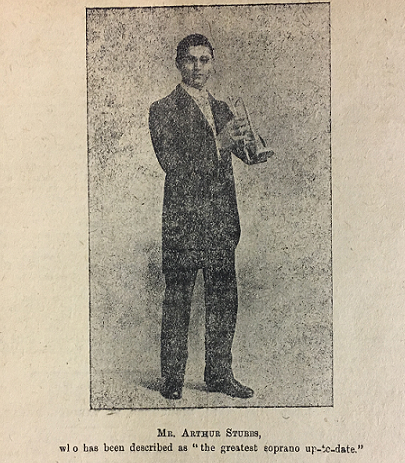
The man and the claim...
Manchester United’s famous Old Trafford stadium has provided the stage for many of the world’s finest football players - from Billy Meredith and Duncan Edwards to the ‘Holy Trinity’ of Best, Charlton and Law, and even the modern day superstars of Eric Cantona and Cristiano Ronaldo.
However, it’s debatable that any modern day fans that make their way through the turnstiles would be able to make a case for including a certain Arthur Stubbs in the ground’s pantheon of virtuoso performers.
Back in 1915 though, this was the man who was proclaimed with recourse to hyperbolic syntax as being, ‘The greatest soprano player up-to-date’.
Interests of humanity
According to the press he was the star attraction, ‘...that we must all listen to’ amid ‘a galaxy of stars’ of Foden’s Band, who, ‘in the interest of humanity’, were to perform a concert there.
Wow. Not even Neymar’s PR agent could come up with anything better than that - even for £200 million quid.
According to the press he was the star attraction, ‘...that we must all listen to’ amid ‘a galaxy of stars’ of Foden’s Band, who, ‘in the interest of humanity’, were to perform a concert there.
Not surprisingly, and thanks to some detailed research, at least part of the curious story of Arthur Stubbs, ‘The greatest soprano player up-to-date’ has now been revealed as one of success, failure, intrigue and of course, quite brilliant PR...
Real Madrid
Foden’s in the second decade of the 20th century were the brass band equivalent of Real Madrid let alone Manchester United - a must see musical attraction.
Despite the industrial demands of the First World War, they performed a huge number of concerts, with proceeds going towards various War Relief Funds.
Everyone wanted to hear the players, such as the remarkable principal cornet Edwin Firth, that had already won the September British Open in 1909, 1910, 1912 and 1913 (and would again in 1915) as well as the National in 1910.
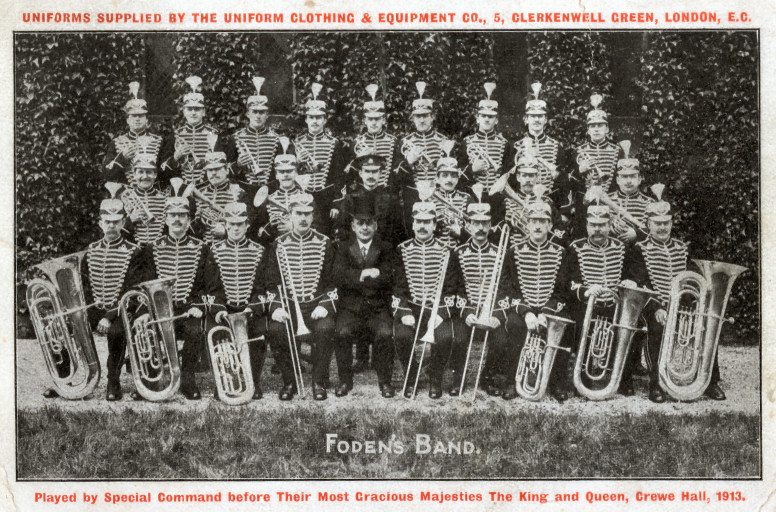 The must see band of the era: Foden's in 1913 - complete with Hussar uniforms
The must see band of the era: Foden's in 1913 - complete with Hussar uniforms
Tremendous crowd
The original concert had been planned for Manchester Racecourse, but, according to the newspaper, ‘...there has been such a rush for tickets that it was feared that the racecourse would not hold the tremendous crowd expected.’
As a result the correspondent’s typewriter went into excited PR hyperbole: ‘Now I am given to understand that United’s ground is capable of holding millions, and it was thought that in the interest of humanity it would be better to have the concert on the football ground.’
However, the intrepid reporter was not finished - and it is here that the name of Arthur Stubbs appears - alongside his image.
‘I am told’, they added, ‘...although as we all know, Foden’s are a galaxy of stars, there is one in particular that we must all listen to, and it is the soprano player: The greatest soprano player up-to-date. No one knows what thirty years hence might bring along, but in Mr Stubbs I believe we have it.’
‘...although as we all know, Foden’s are a galaxy of stars, there is one in particular that we must all listen to, and it is the soprano player: The greatest soprano player up-to-date. No one knows what thirty years hence might bring along, but in Mr Stubbs I believe we have it.’
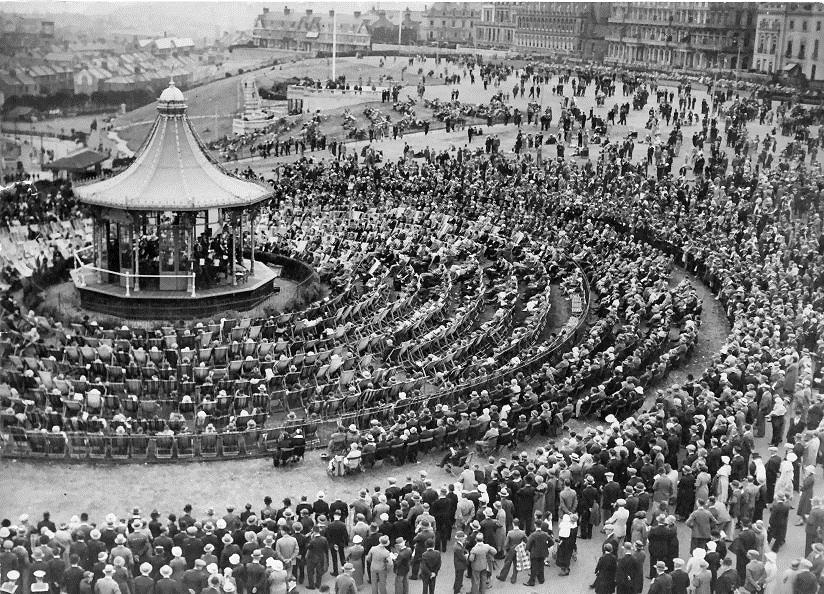 At their peak, Foden's attracted huge crowds wherever they played
At their peak, Foden's attracted huge crowds wherever they played
Who was Arthur Stubbs?
So who was Arthur Stubbs - and could he really lay claim to be ‘the greatest’ in banding history to that point?
It is certainly a curious tale, according to Allan Littlemore, who wrote an acclaimed official history of the band, entitled, ‘One Hundred Years of Musical Excellence’ in the year 2000, and who was sent the press cutting a few months ago.
“It found its way to me after someone saw it in an old copy of the local ‘Chronicle’ newspaper at the library,” he said. “I was immediately intrigued. I’ve done a fair bit of research over the years into the band, but this story has seemingly been lost in the midsts of time.
I knew very little of Arthur Stubbs, so either he was a forgotten superstar player, or had a top quality publicist - or perhaps even both.”
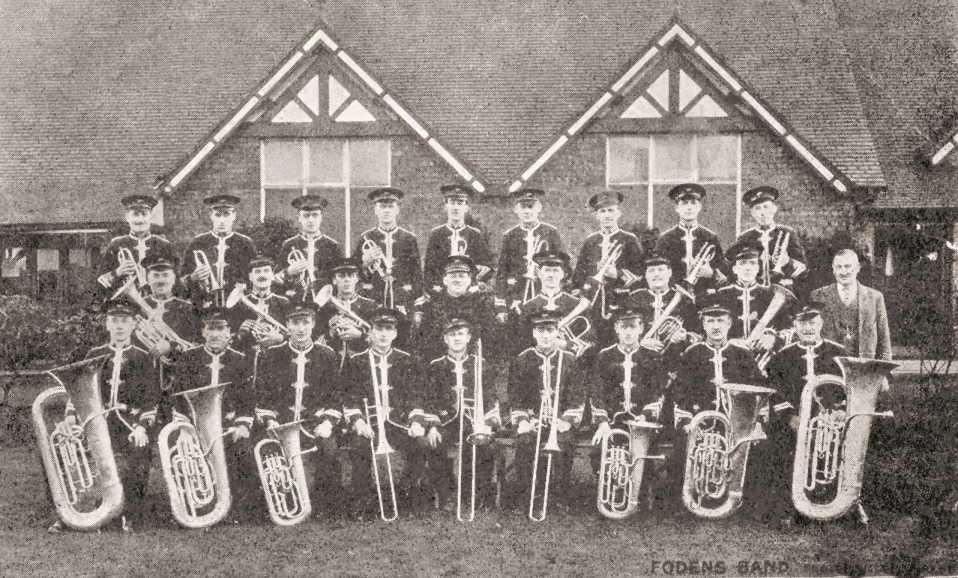 Foden's in 1925: Arthur Stubbs in the ranks
Foden's in 1925: Arthur Stubbs in the ranks
Research
Allan started looking back at his extensive research and contacted Jimmie Charles, an acknowledged expert on Foden’s thanks to his half century and more connected with the band.
“The Foden’s Band player register started the 1920s and Stubbs certainly appears - right up to 1928 when Foden’s won the British Open for a third time as part of their 1926-28 hat-trick under William Halliwell,” Allan said.
“However, back when they were winning the contest between 1909 and 1915, the soprano was the great Joe Brookes, regarded by critics and fellow performers as the finest in the country.
However, back when they were winning the contest between 1909 and 1915, the soprano was the great Joe Brookes, regarded by critics and fellow performers as the finest in the country.
There is a recording of him on an Edison Bell 78 rpm disc of 1914 playing music from ‘Cavalleria Rusticana’ - and it still sends a shiver down the spine. Stubbs would have had to have been some player to better him.”
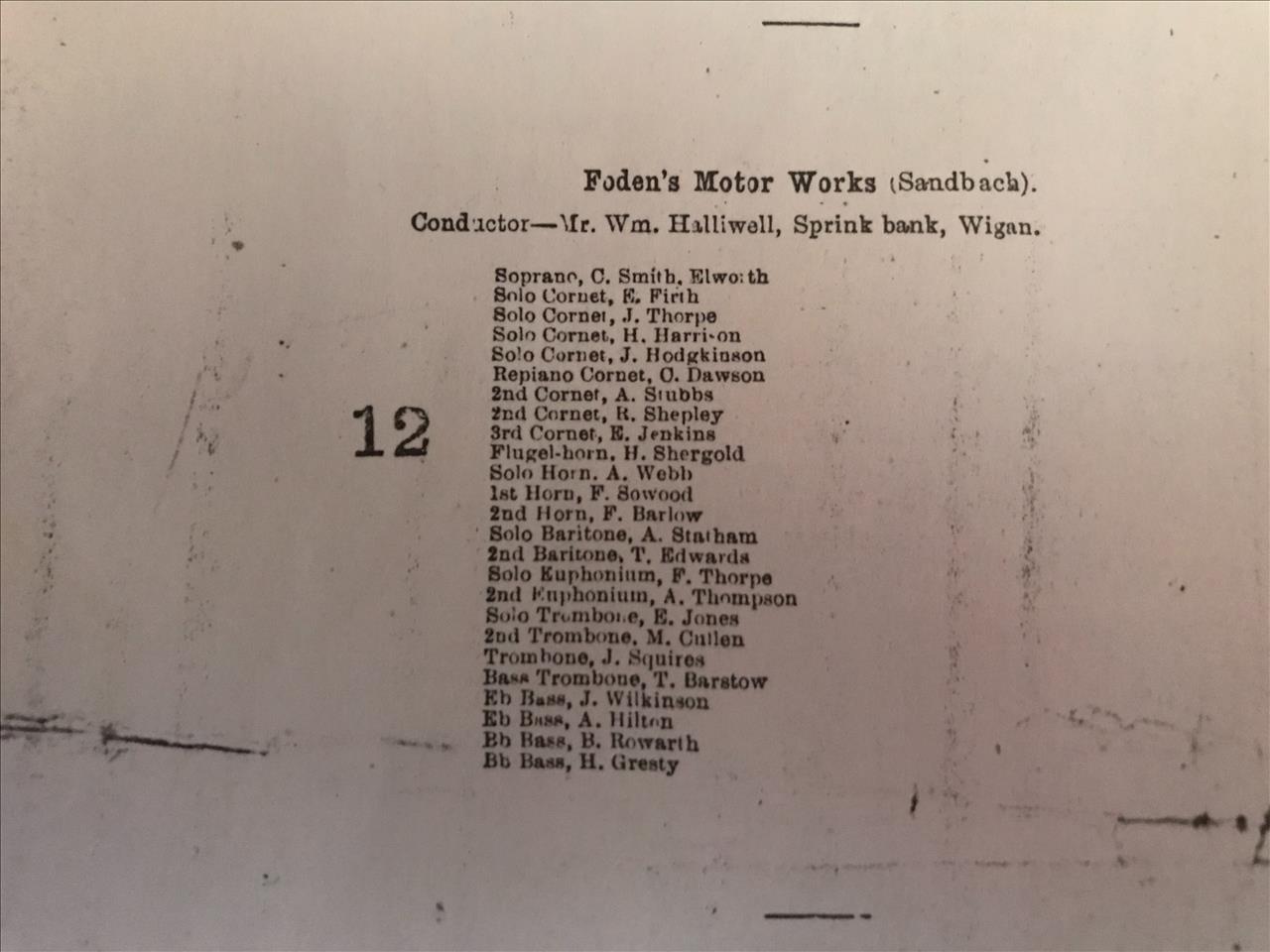 The British Open programme of 1915: A. Stubbs 2nd cornet
The British Open programme of 1915: A. Stubbs 2nd cornet
Reinforced
That opinion seems to be reinforced by the fact that by the time Brookes left Foden’s to play with the Horwich RMI Band in 1915 (helping them win the Open in 1916 and 1917) his place for the September ‘Open’ (which Foden’s won) was filled by someone called C. Smith - with Arthur Stubbs noted in the programme (which contained the names and addresses of every player taking part) as a second cornet player.
Far from the ‘world’s greatest’ then - although by the time of the 1916 contest, Arthur Stubbs of George Street, Elworth, occupied the soprano seat. Foden’s came runner-up.
That seemed to signal the end for the once ‘greatest’ soprano player, as a certain Fred Mortimer opted for a chap called George Clark with Arthur demoted to repiano.
There he remained for the 1917 Open (the band came sixth), but by 1918 Bandmaster Tom Hynes decided Arthur needed help and two soprano cornets were registered for the contest. The plan failed, as Foden’s came fifth. The following two years with Arthur on sop by himself, they didn’t feature in the prizes and failed to compete from 1922 - 1925.
That seemed to signal the end for the once ‘greatest’ soprano player, as a certain Fred Mortimer opted for a chap called George Clark with Arthur demoted to repiano.
Hat trick mystery
The tale does not quite end there, even though on their victorious return to the September Open in 1926 on ‘A Midsummer Night’s Dream’, Arthur Stubbs was still on repiano and in 1927 was named as the second soprano corent as they won again.
Now comes a little bit of mystery, as Allan reveals.
“The 1928 September Open programme clearly states that Arthur Stubbs was one of two soprano players (once again alongside G. Clark) as Foden’s completed the hat-trick and won the Jennison Trophy outright on ‘Lorenzo’ by Thomas Keighley - a piece with a demanding and all important soprano part.
However, in the report of the win in the Sandbach Weekly Chronicle, they listed the members of the band and their years of service - and it very clearly says, ‘Soprano cornet, George Clark - 5 years’. Arthur Stubbs is nowhere to be seen. He longer appeared in the band register either.”
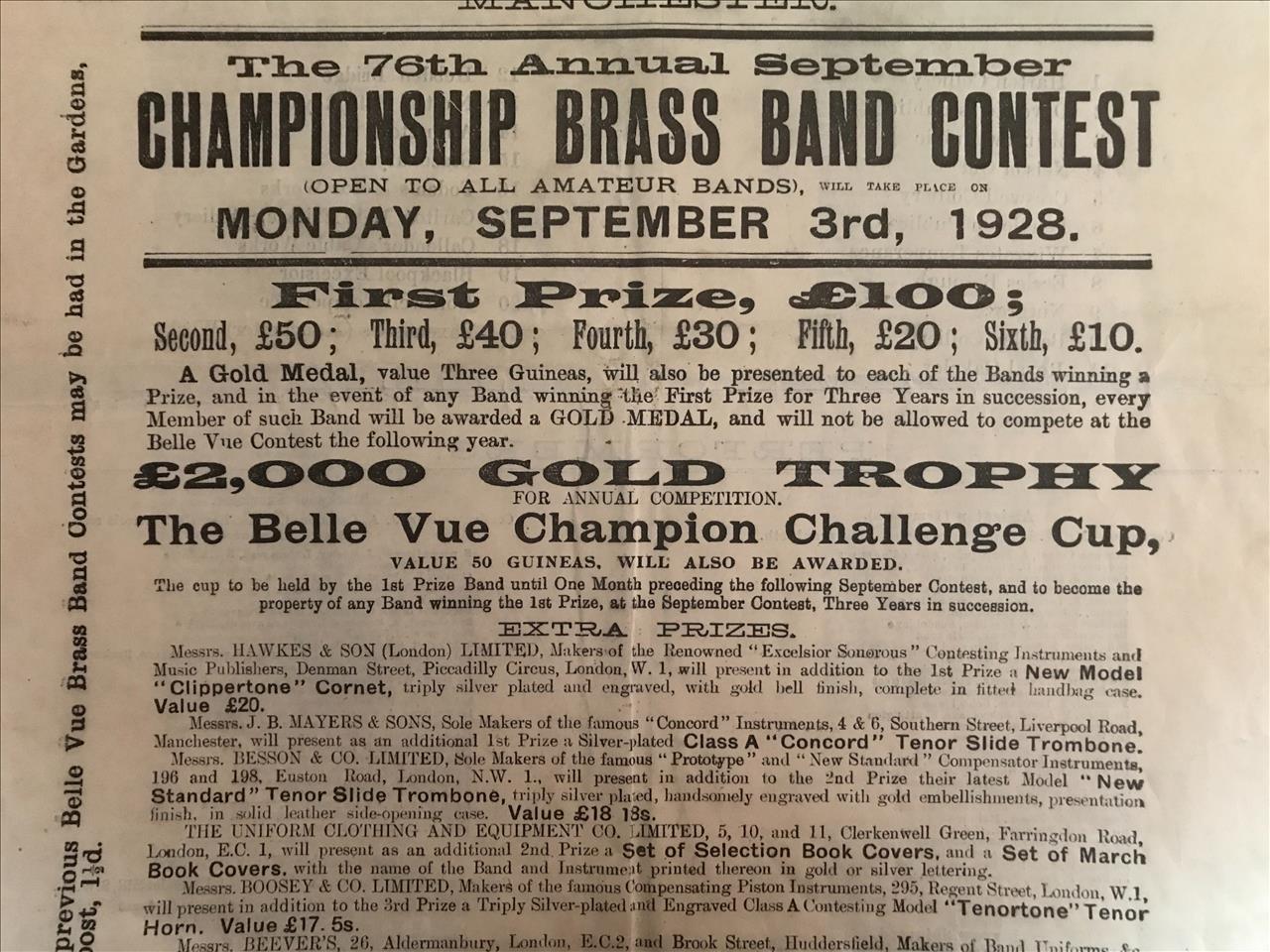 The last success? The British Open programme of 1928
The last success? The British Open programme of 1928
Better bet
It would appear then, that the one-time, ‘greatest soprano up-to-date’ had finally played his last note with the band - although it appears it was a hat-trick winning one. There were to be no more Old Trafford appearances with the ‘galaxy’ of Foden’s stars.
Allan thinks he knows why.
Ironically, a detailed report of Foden’s winning 1928 performance stated that the soprano player had ‘a difficult day’, so perhaps that was the justification they needed. Mortimer cared not for reputations - even if a player was once described as being ‘the greatest’.
“I suspect that between the printing of the contest day programme and the local news report, Bandmaster Fred Mortimer and Professional Conductor William Halliwell decided that George Clark was the better long term bet - although a few years later along came a certain Charlie Cook - arguably the greatest of them all.
Ironically, a detailed report of Foden’s winning 1928 performance stated that the soprano player had ‘a difficult day’, so perhaps that was the justification they needed. Mortimer cared not for reputations - even if a player was once described as being ‘the greatest’.”
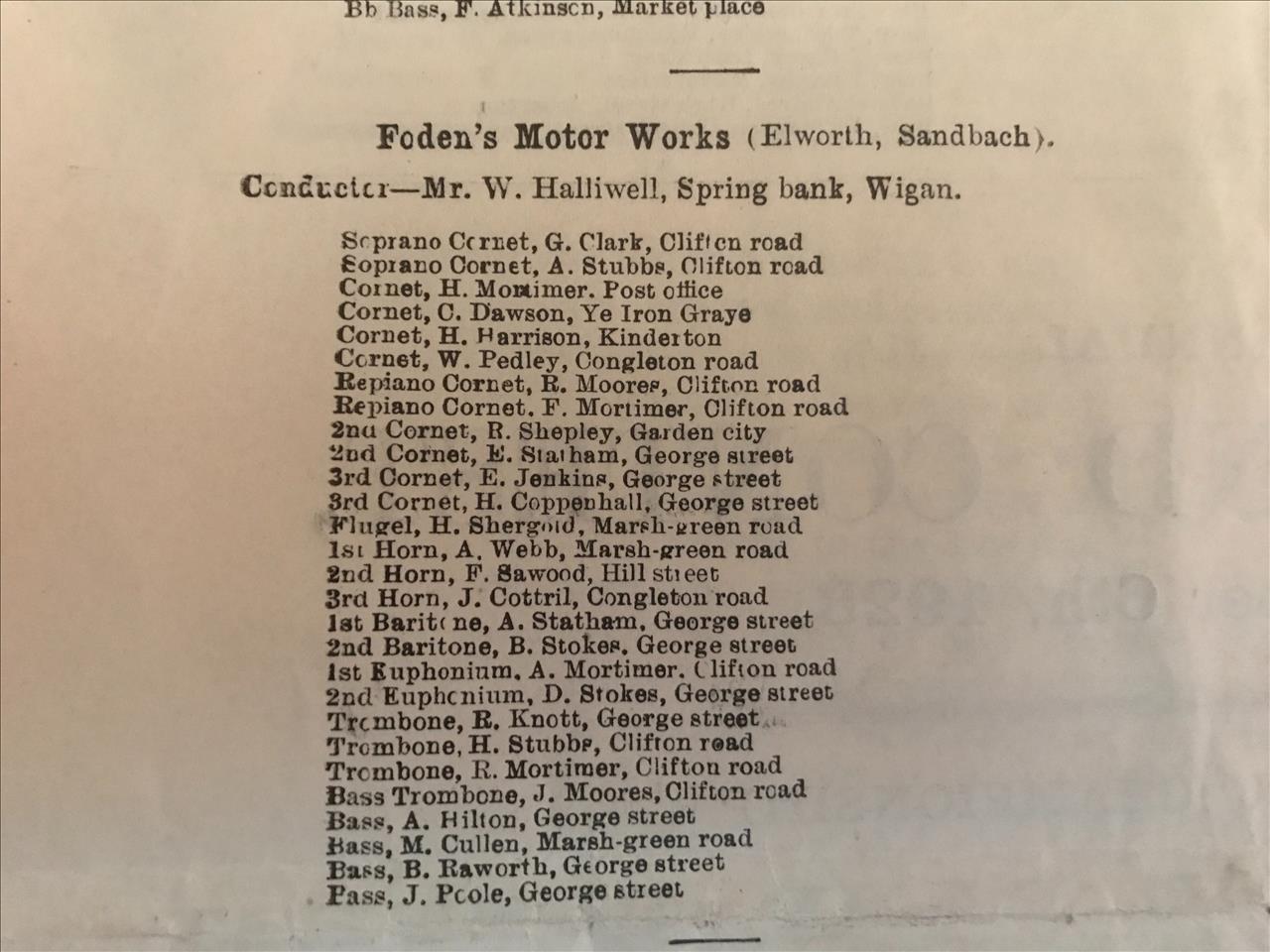 A. Stubbs - 2nd sop. (note the chap living at the Post Office though...)
A. Stubbs - 2nd sop. (note the chap living at the Post Office though...)
Fantastic PR
So, in answer to the question posed at the beginning of this story?
Allan rounds things off: “I think Arthur Stubbs was a fine, versatile cornet player, but only a decent soprano – and certainly not the ultimate superstar that an eager reporter once described him as.
Perhaps it goes to show that there is nothing new under the brass banding sun. Fantastic PR - even from 102 years ago, should still be treated with a fair amount of scepticism.
I would love to find out more though, and what eventually became of him after that Old Trafford appearance, but with at least 90 entries listed under the surname Stubbs in the local phone books alone, someone else might have to do it for me.”
Iwan Fox

